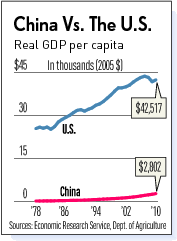China Isn't Ready To Lead The World
China: Listening to the media, you'd think Chinese President Hu Jintao's U.S. trip is nothing less than a symbolic transfer of world leadership from an America in decline to a China in ascendancy. Not by a long shot.
With all our problems, it's almost fashionable these days to speak of the U.S. as a world power on the wane. One thoughtful piece after another bemoans the nation's problems and its inevitable slippage into irrelevance. This, in fact, is the subtext of President Obama's talks with President Hu.
Obama gave this credence by giving Hu — whom Senate Majority Leader Harry Reid correctly called a "dictator" — a state dinner, something that President Bush refused to do.
Why the obsequiousness? China is the country of the future, we're told. What Walter Lippman dubbed the American Century died in 2001; this century belongs to China.
The arrogant rhetoric of China's leaders encourages such thinking. That includes remarks by Hu, who on Wednesday asserted the U.S. dollar must yield to China's yuan as the world's leading currency, and who seems to believe China is ready to elbow us aside.
All this, however, is little more than bluster.
We hear constantly how China's economy has "leapfrogged" other nations and now ranks third in the world — still behind the U.S. — with a total GDP of $3.3 trillion. The truth is more complex.
China has 1.3 billion people. So you're spreading that economy among one-sixth of the world's humanity. As the chart shows, China's economy on a per-person basis — the real measure of success — doesn't even come close to ours. The average American produces over $42,000 a year in goods and services; the average Chinese produces $2,800. That's an enormous gap in productivity.
Moreover, in its recent rankings of economic freedom, the Heritage Foundation put China 135th out of 179 countries. The U.S., even with all its current problems, ranks ninth. Who's the leader?
Citizens in big cities such as Beijing and Shanghai live a privileged existence, well-documented by the Western media. Deep inside rural China, however, hundreds of millions live in near-absolute poverty. This isn't a country ready for global economic leadership.
China's economic success has been driven by mercantilist policy of beggaring its own people in the interest of building up massive trade surpluses. Its foreign currency holdings now total $2.9 trillion, and most of that is in U.S. Treasuries and other dollar-denominated assets. That's China's hole-card in talks with the U.S.
Americans fret over China holding so much U.S. debt. "What Is Plan B If China Dumps Its U.S. Debt?" a recent Reuters headline asks. The question isn't what we would do — it's what China would do. Dumping U.S. debt would push the dollar down sharply. Since dollar-based assets make up the bulk of China's portfolio, they'd be shooting themselves in the foot by dumping them on the market.
We now buy $330 billion of Chinese goods each year. That too would plunge if the dollar weakened. China's entire economy is built on U.S. trade and investment.
Would China jeopardize that?
But China faces an even more serious long-term problem: demographics. China's population will peak in about 15 years at about 1.395 billion, according to U.S. government projections, and then begin a long, steady decline, the result of the one-child policy in place since the mid-1970s. Meanwhile, the average age of its population will soar. That is, they'll have fewer workers and more retirees.
History shows that countries with aging, shrinking populations lose economic vigor. China's double-digit GDP growth will end as it becomes little more than an old folks' home. That's China's demographic fate, and sooner than you might think.
Yes, China will be a formidable military foe. It's using its trade dollars to fuel a double-digit spending boom for its military, building new stealth fighters, a fleet of submarines and, most ominously, a blue-water navy that will soon challenge the U.S. for supremacy in the Far East. We should face this threat head-on.
But economically, China faces formidable challenges — challenges that the U.S., with a growing population; a flexible, well-trained work force and an openness to outside influences, will not share.
Forty years from now, and contrary to the fashionable opinions of today, don't be surprised to find the U.S. still on top.


